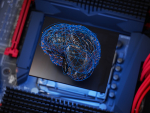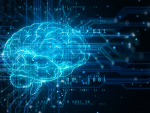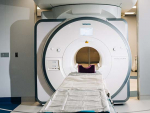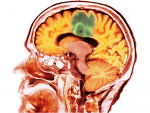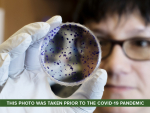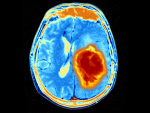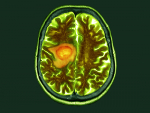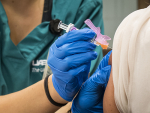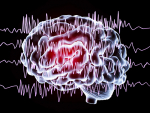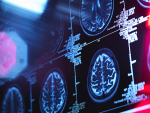Displaying items by tag: department of neurosurgery
The grant program funds early-career faculty to advance their skills and careers across campus and beyond.
Tagged under
- release
- college of arts and sciences
- office of the provost for student and faculty success
- school of medicine
- department of medicine
- department of physics
- department of biology
- school of engineering
- department of civil construction and environmental engineering
- school of health professions
- department of clinical and diagnostic sciences
- school of nursing
- department of music
- department of surgery
- department of radiation oncology
- department of neurosurgery
- division of genomics and bioinformatics
- division of pulmonary allergy and critical care medicine
- department of sociology
- department of family and community medicine
- department of criminal justice
- department of chemistry
The fields of neuroengineering and brain-computer interfaces could have a tremendous impact on a number of neurologic conditions, such as stroke, neurodegenerative disorders, Parkinson’s disease, dementia and other brain diseases.
Tagged under
The grant will fund research surrounding next-generation human models that could potentially aid in the development of treatment for glioblastoma.
Tagged under
UAB’s new intraoperative MRI suite allows for real time magnetic resonance imaging during surgical procedures.
Tagged under
Disruption of Blimp1 in regulatory T cells remodels the tumor microenvironment and augments the response to immunotherapy.
Tagged under
At UAB, the company IN8bio Inc. is running a Phase I clinical trial to treat glioblastoma multiforme, the most aggressive type of cancer that originates in the brain.
Tagged under
Pulmonary embolism is a life-threatening condition that accounts for approximately 100,000 deaths annually in the United States. PERT was established to ensure UAB patients receive the best possible care for their specific situation.
Tagged under
- release
- school of medicine
- department of medicine
- division of cardiovascular disease
- division of pulmonary allergy and critical care medicine
- department of emergency medicine
- department of neurosurgery
- department of surgery
- division of vascular surgery and endovascular therapy
- spain rehabilitation center
The new grant links UAB researchers with colleagues at two other institutions to search for ways to advance therapies from bench to bedside.
Tagged under
Tagged under
- release
- advancement
- office of the president
- office of the provost for student and faculty success
- department of anesthesiology and perioperative medicine
- department of neurology
- department of biochemistry and molecular genetics
- department of cell developmental and integrative biology
- department of clinical and diagnostic sciences
- department of dermatology
- department of emergency medicine
- department of family and community medicine
- department of genetics
- department of medical education
- department of medicine
- department of microbiology
- department of neurobiology
- department of neurosurgery
- department of obstetrics and gynecology
- department of ophthalmology and visual sciences
- department of orthopaedic surgery
- department of otolaryngology
- department of pathology
- department of pediatrics
- department of pharmacology and toxicology
- department of physical medicine and rehabilitation
- department of psychiatry and behavioral neurobiology
- department of radiation oncology
- department of radiology
- department of surgery
- division of academic general pediatrics
- division of acute care surgery
- division of adolescent medicine
- division of advanced medical imaging
- division of anatomic pathology
- division of cardiothoracic surgery
- division of cardiothoracic anesthesia
- division of child abuse pediatrics
- division of clinical immunology and rheumatology
- division of community anesthesia
- division of diagnostic radiology
- division of developmental and behavioral pediatrics
- division of forensic pathology
- division of gastroenterology and hepatology
- division of gastrointestinal surgery
- division of general internal medicine
- division of general pediatrics and adolescent medicine
- division of genomics and bioinformatics
- division of gerontology geriatrics and palliative care
- division of gynecologic oncology
- division of hematology and oncology
- division of infectious diseases
- division of informatics
- division of laboratory medicine
- division of maternal fetal medicine
- division of molecular and translational biomedicine
- division of molecular imaging and therapeutics
- division of multispecialty anesthesia
- division of neonatology
- division of nephrology
- division of neuro oncology
- division of neuropathology
- division of pain medicine
- division of pediatric allergy and immunology
- division of pediatric hematology oncology
- division of pediatric cardiology
- division of pediatric critical care medicine
- division of pediatric dermatology
- division of pediatric emergency medicine
- division of pediatric endocrinology
- division of pediatric gastroenterology
- division of pediatric hospital medicine
- division of pediatric infectious diseases
- division of pediatric nephrology
- division of pediatric neurology
- division of pediatric oncology
- division of pediatric optometry
- division of pediatric pulmonary and sleep medicine
- division of pediatric rehabilitation medicine
- division of pediatric rheumatology
- division of pediatric surgery
- division of plastic surgery
- division of preventive medicine
- division of pulmonary allergy and critical care medicine
- division of reproductive endocrinology and infertility
- division of surgical oncology
- division of transplantation
- division of vascular surgery and endovascular therapy
- 1917 clinic
- acute care for elders unit
- addiction recovery program
- addiction recovery scholars
- alabama genomic health initiative
- all of us research program
- autism spectrum disorders clinic at uab
- center for addiction and pain prevention and intervention
- center for aids research
- center for clinical and translational science
- center for emerging drug discovery
- center for exercise medicine
- center for free radical biology
- center for interprofessional education and simulation
- center for genomic medicine
- center for low vision rehabilitation
- center for metabolic bone disease
- center for neurodegeneration and experimental therapeutics
- center for outcomes and effectiveness research and education
- center for palliative and supportive care
- center for pediatric onset demyelinating disease
- civitan international neuroimaging laboratory
- civitan international research center
- civitan sparks clinics
- comprehensive arthritis musculoskeletal and autoimmunity center
- comprehensive cardiovascular center
- comprehensive center for healthy aging
- comprehensive diabetes center
- comprehensive neuroscience center
- comprehensive stroke center
- comprehensive transplant institute
- deep south resource center for minority aging research
- gregory fleming james cystic fibrosis research center
- epilepsy center
- heflin center for genomic sciences
- hepatorenal fibrocystic diseases core center
- informatics institute
- institute for cancer outcomes and survivorship
- legacy of hope
- liver center
- lung health center
- mcknight brain institute
- minority health and health equity research center
- mucosal hiv and immunobiology center
- multiple sclerosis center
- national spinal cord injury statistical center
- nephrology research and training center
- obesity health disparities research center
- obrien center for acute kidney injury research
- pancreatobiliary disease center
- parkinsons disease information and referral center
- pediatric pulmonary center
- precision medicine institute
- primary care research collaborative
- spain rehabilitation center
- school of medicine
A small molecule inhibitor has been identified that reduces the growth of uveal melanoma, a rare and deadly cancer of the eye.
Tagged under
G207, an immunotherapy derived from a modified herpes virus is well tolerated in children with gliomas, and shows signs of clinical effectiveness
Tagged under
The study points to an adhesive cell surface protein that might be a key element in tackling the resistance to radiation therapy commonly seen in glioblastoma tumors.
Tagged under
James Markert, M.D., MPH, the James Garber Galbraith Endowed Chair of Neurosurgery at the University of Alabama at Birmingham, is the president-elect of the American Academy of Neurological Surgery for 2020-2021.
Tagged under
With misinformation about COVID-19 vaccines rife, turn to trusted medical professionals at UAB’s Department of Medicine for the straight dope.
Tagged under
Migraine headaches were ruining Christopher Sheheane’s life, until a visit to UAB found the cause: a pituitary gland tumor.
Tagged under
Physicians say it is crucial for trainees to have role models and mentors who have shared experiences.
Tagged under
This is thought to be the first time that information found via artificial intelligence has led to a clinical trial.
Case studies show five people who found better treatments for neuropsychiatric symptoms from data collected while patients were at home.
Cole Burton came back to the UAB Trauma Center to say thanks as his rehab progresses to a possible naval career.
Investigators at the University of Alabama at Birmingham and Stanford University want to learn more about silent strokes and their role in brain health, including dementia.
Tagged under

